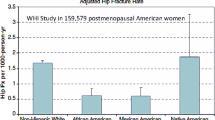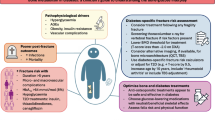Abstract
The aim of the study was to evaluate the 10-year probability of hip fracture and a major osteoporotic fracture using the FRAX algorithm, vitamin D status, bone mineral density (BMD), and biochemical markers of bone turnover in men over 50 years of age with type 2 diabetes mellitus (T2DM). We estimated FRAX-predicted 10-year fracture probability, levels of 25-hydroxyvitamin D (25-OH-D), markers of bone turnover, and bone mineral density at the L1–L4 (lumbar spine (LS)) and femur neck (FN) in 68 men with T2DM and compared these with an age-matched group (n = 68). The mean (range) age of the T2DM group was 61.4 (51–78) years. The prevalence of hypovitaminosis D (25-OH-D <75 nmol/L) was 59 %. The mean (range) FRAX hip fracture and FRAX major osteoporotic fracture was 0.7 (0–2.8) and 3.2 (0–8.5) %, respectively. BMD at the FN (0.974 vs. 0.915 g/cm2, p = 0.008) and LS (1.221 vs. 1.068 g/cm2, p < 0.001) was significantly higher in the T2DM cohort as compared to the healthy age-matched males. 25-OH-vitamin D (67.7 vs.79.8 nmol/L, p < 0.001), crosslaps (0.19 vs. 0.24 μg/L, p = 0.004), and osteocalcin (13.3 vs. 15.7 μg/L, p = 0.004) were significantly lower in the T2DM group. There was no difference in FRAX-related fracture probability between the two groups. Acknowledging the limitations of our study size, we suggest that the increased BMD in T2DM and the noninclusion of T2DM as a secondary risk factor in the FRAX algorithm may be probable explanations for the discordance between literature-observed and FRAX-related fracture probabilities.
Similar content being viewed by others
References
Schwartz AV (2003) Diabetes mellitus: does it affect bone? Calcif Tissue Int 73:515–519
Inzerillo AM, Epstein S (2004) Osteoporosis and diabetes mellitus. Rev Endocr Metab Disord 5:261–268
Leidig-Bruckner G, Ziegler R (2001) Diabetes mellitus—a risk for osteoporosis? Exp Clin Endocrinol Diabetes 109:S493–S514
de Liefde II, van der Klift M, de Laet CE et al (2005) Bone mineral density and fracture risk in type-2 diabetes mellitus: the Rotterdam Study. Osteoporos Int 16(12):1713–20
Strotmeyer ES, Cauley JA, Schwartz AV et al (2005) Nontraumatic fracture risk with diabetes mellitus and impaired fasting glucose in older white and black adults: the health, aging, and body composition study. Arch Intern Med 165:1612–7
Schwartz AV, Vittinghoff E, Bauer DC et al (2011) Association of BMD and FRAX score with risk of fracture in older adults with type 2 diabetes. JAMA 305:2184–92
Janghorbani M, Van Dam RM, Willett WC, Hu FB (2007) Systematic review of type 1 and type 2 diabetes mellitus and risk of fracture. Am J Epidemiol 166:495–505
Lipscombe LL, Jamal SA, Booth GL, Hawker GA (2007) The risk of hip fractures in older individuals with diabetes: a population-based study. Diabetes Care 30:835–41
Einhorn TA, Boskey AL, Gundberg CM, Vigorita VJ, Devlin VJ, Beyer MM (1988) The mineral and mechanical properties of bone in chronic experimental diabetes. J Orthop Res 6:317–323
Akune T, Ogata N, Hoshi K et al (2002) Insulin receptor substrate-2 maintains predominance of anabolic function over catabolic function of osteoblasts. J Cell Biol 159:147–156
Ogata N, Chikazu D, Kubota N et al (2000) Insulin receptor substrate-1 in osteoblast is indispensable for maintaining bone turnover. J Clin Invest 105:935–943
Fulzele K, Riddle RC, DiGirolamo DJ et al (2010) Insulin receptor signaling in osteoblasts regulates postnatal bone acquisition and body composition. Cell 142:309–319
Thomas DM, Hards DK, Rogers SD, Ng KW, Best JD (1996) Insulin receptor expression in bone. J Bone Miner Res 11:1312–1320
Wergedal JE, Baylink DJ (1984) Characterization of cells isolated and cultured from human bone. Proc Soc Exp Biol Med 176:60–69
Canalis EM, Dietrich JW, Maina DM, Raisz LG (1977) Hormonal control of bone collagen synthesis in vitro. Effects of insulin and glucagon. Endocrinology 100:668–674
Canalis E (1983) Effect of hormones and growth factors on alkaline phosphatase activity and collagen synthesis in cultured rat calvariae. Metabolism 32:14–20
Hahn TJ, Westbrook SL, Sullivan TL, Goodman WG, Halstead LR (1988) Glucose transport in osteoblast-enriched bone explants: characterization and insulin regulation. J Bone Miner Res 3:359–365
Thomas DM, Udagawa N, Hards DK et al (1998) Insulin receptor expression in primary and cultured osteoclast-like cells. Bone 23:181–186
Bouillon R, Bex M, Van Herck E et al (1995) Influence of age, sex, and insulin on osteoblast function: osteoblast dysfunction in diabetes mellitus. J Clin Endocrinol Metab 80:1194–1202
Jehle PM, Jehle DR, Mohan S, Böhm BO (1998) Serum levels of insulin-like growth factor system components and relationship to bone metabolism in type 1 and type 2 diabetes mellitus patients. J Endocrinol 159:297–306
Moller DE, Flier JS (1997) Insulin resistance—mechanisms, syndromes, and implications. N Engl J Med 325:938–948
Reid IR, Evans MC, Cooper GJ, Ames RW, Stapleton J (1993) Circulating insulin levels are related to bone density in normal postmenopausal women. Am J Physio 265:E655–E659
Smythe HA (1987) Osteoarthritis, insulin and bone density. J Rheumatol 14:91–93
Haffner SM, Bauer RL (1993) The association of obesity and glucose and insulin concentrations with bone density in premenopausal and postmenopausal women. Metabolism 42:735–738
Sambrook PN, Eisman JA, Pocock NA, Jenkins AB (1988) Serum insulin and bone density in normal subjects. J Rheumatol 15:1415–1417
Plymate SR, Matej LA, Jones RE, Friedl KE (1988) Inhibition of sex hormone-binding globulin production in the human hepatoma (Hep G2) cell line by insulin and prolactin. J Clin Endocrinol Metab 67:460–464
Birkeland KI, Hanssen KF, Torjesen PA, Vaaler S (1993) Level of sex hormone-binding globulin is positively correlated with insulin sensitivity in men with type 2 diabetes. J Clin Endocrinol Metab 76:275–278
Preziosi P, Barrett-Connor E, Papoz L (1993) Interrelation between plasma sex hormone-binding globulin and plasma insulin in healthy adult women: the telecom study. J Clin Endocrinol Metab 76:283–287
Peiris AN, Stagner JI, Plymate SR, Vogel RL, Heck M, Samols E (1993) Relationship of insulin secretory pulses to sex hormone-binding globulin in normal men. J Clin Endocrinol Metab 76:279–282
Lindsay R (1991) Why do oestrogens prevent bone loss? Baillieres Clin Obstet Gynaecol 5:837–852
Conover CA, Ronk M, Lombana F, Powell DR (1996) Insulin-like growth factor-binding protein-1 expression in cultured human bone cells: regulation by insulin and glucocorticoid. Endocrinology 137:3295–3301
Suzuki K, Miyakoshi N, Tsuchida T, Kasukawa Y, Sato K, Itoi E (2003) Effects of combined treatment of insulin and human parathyroid hormone(1-34) on cancellous bone mass and structure in streptozotocin-induced diabetic rats. Bone 33:108–114
Williams JP, Blair HC, McDonald JM et al (1997) Regulation of osteoclastic bone resorption by glucose. Biochem Biophys Res Commun 235:646–651
Hofbauer LC, Brueck CC, Singh SK, Dobnig H (2007) Osteoporosis in patients with diabetes mellitus. J Bone Miner Res 22:1317–1328
Vashishth D, Gibson GJ, Khoury JI, Schaffler MB, Kimura J, Fyhrie DP (2001) Influence of nonenzymatic glycation on biomechanical properties of cortical bone. Bone 28:195–201
Saito M, Fujii K, Mori Y, Marumo K (2006) Role of collagen enzymatic and glycation induced cross-links as a determinant of bone quality in spontaneously diabetic WBN/Kob rats. Osteoporos Int 17:1514–1523
D’Erasmo E, Pisani D, Ragno A, Raejntroph N, Vecci E, Acca M (1999) Calcium homeostasis during oral glucose load in healthy women. Horm Metab Res 31:271–273
Okazaki R, Totsuka Y, Hamano K et al (1997) Metabolic improvement of poorly controlled noninsulin-dependent diabetes mellitus decreases bone turnover. J Clin Endocrinol Metab 82:2915–2920
Scragg R, Holdaway I, Singh V, Metcalf P, Baker J, Dryson E (1995) Serum 25-hydroxyvitamin D3 levels decreased in impaired glucose tolerance and diabetes mellitus. Diabetes Res Clin Pract 27:181–188
Baynes KC, Boucher BJ, Feskens EJ, Kromhout D (1997) Vitamin D, glucose tolerance and insulinaemia in elderly men. Diabetologia 40:344–347
http://www.shef.ac.uk/FRAX/. Accessed 08 Dec 2012
Krakauer JC, McKenna MJ, Buderer NF et al (1995) Bone loss and bone turnover in diabetes. Diabetes 44:775–82
Dobnig H, Piswanger-Solkner JC, Roth M (2006) Type 2 diabetes mellitus in nursing home patients: effects on bone turnover, bone mass, and fracture risk. J Clin Endocrinol Metab 91:3355–3363
Achemlal L, Tellal S, Rkiouak F (2005) Bone metabolism in male patients with type 2 diabetes. Clin Rheumatol 24:493–496
Fardellone P, Sebert JL, Bouraya M et al (1991) [Evaluation of the calcium content of diet by frequential self-questionnaire]. Rev Rhum Mal Osteoartic 58:99–103
Dawson-Hughes B, Heaney RP, Holick MF, Lips P, Meunier PJ, Vieth R (2005) Estimates of optimal vitamin D status. Osteoporos Int 16:713–716
Bhattoa HP, Nagy E, More C et al (2013) Prevalence and seasonal variation of hypovitaminosis D and its relationship to bone metabolism in healthy Hungarian men over 50 years of age: the HunMen Study. Osteoporos Int 24:179–186
Schwartz AV, Hillier TA, Sellmeyer DE et al (2002) Older women with diabetes have a higher risk of falls: a prospective study. Diabetes Care 25:1749–1754
Petit MA, Paudel ML, Taylor BC (2010) Bone mass and strength in older men with type 2 diabetes: the osteoporotic fractures in men study. J Bone Miner Res 25:285–291
Giangregorio LM, Leslie WD, Lix LM et al (2012) FRAX underestimates fracture risk in patients with diabetes. J Bone Miner Res 27:301–308
Ford ES, Ajani UA, McGuire LC, Liu S (2005) Concentrations of serum vitamin D and the metabolic syndrome among U.S. adults. Diabetes Care 28:1228–30
Yaturu S, Davis J (2011) Prevalence of decreased vitamin D Levels is high among veterans with diabetes and/or CKD. ISRN Endocrinol 2011:109458
Acknowledgments
This work is supported by the OTKA 105073 research grant (H.P.B.) and the TÁMOP 4.2.1./B-09/1/KONV-2010-0007 project (H.P.B, E.K., A.B, G.P., P.A-S., M.K.), which is implemented through the New Hungary Development Plan, co-financed by the European Union and the European Social Fund.
Disclosures
None.
Author information
Authors and Affiliations
Corresponding author
Rights and permissions
About this article
Cite this article
Bhattoa, H.P., Onyeka, U., Kalina, E. et al. Bone metabolism and the 10-year probability of hip fracture and a major osteoporotic fracture using the country-specific FRAX algorithm in men over 50 years of age with type 2 diabetes mellitus: a case–control study. Clin Rheumatol 32, 1161–1167 (2013). https://doi.org/10.1007/s10067-013-2254-y
Received:
Revised:
Accepted:
Published:
Issue Date:
DOI: https://doi.org/10.1007/s10067-013-2254-y




